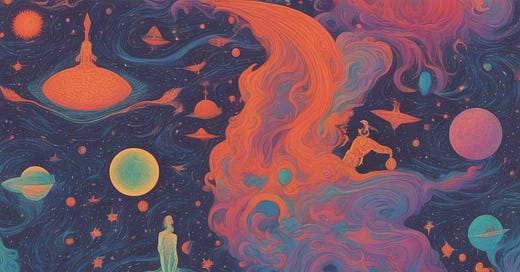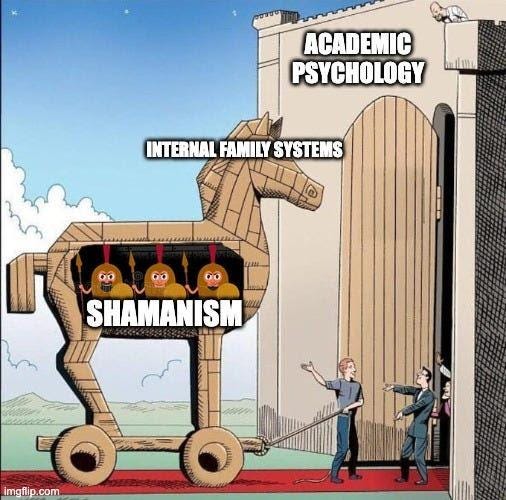Five years ago, I was living a life that, on paper, should’ve made me perfectly happy. I split my days and nights between Columbia’s bougie uptown campus and bustling downtown Manhattan. I had a lovely group of friends, a closet full of stuff, no real responsibilities, an abundance of free time, financial independence, and a well-paying job lined up after graduation.
And yet. And yet, I numbed myself with the neverending delights of Manhattan nightlife, night after night. When my friends went to bed, I’d wander the city’s streets until the early morning hours, coked up and lonely. And yet, I’d spend the majority of my days obsessively restricting my food and overexercising, only to lose all control and shame myself for it later. And yet, at least once a month, I laid in bed, paralyzed by the silent, faceless suffering that had accompanied me all my life, questioning if I still had a good reason to be here.
Soul loss, according to shamanism, is a spiritual illness in which you lose crucial parts of yourself that provide you with life and vitality. This fragmentation results in a painful existence, and so you spent your life masking something you subconsciously feel but are unable to see, hear, or understand.
Without a proper understanding of the human soul, it’s hard to understand what you feel disconnected from. So you accept your low-grade background pain and put your best foot forward to soothe it. Whether through alcohol or drugs, compulsive shopping, sex or dating, daydreaming, or doom-scrolling. If you get lucky, either the pain or your attempts to numb it becomes so unbearable or destructive that you’re forced to investigate. Many never get this lucky, though. And so they continue their empty existence in a world that increasingly tends to lost souls, feeding false remedies that soothe just enough to keep up the illusion of abundance, yet never fully.
The direct manifestation of collective soul loss in this country is the mental health epidemic. 20% of Americans experience mental illness in a given year1, 7% of adults alone experience clinical major depressive disorder.2 Suicide has become the second leading cause of death for those between ages 10 and 34.3
Capitalism, pharmacology, and technology have stepped in to provide (false) remedies for the country’s collective soul loss through consumption, medication, and distraction. As a result of concealing the fragmentation, it becomes even harder to see its roots. Without understanding the roots, it becomes impossible to identify the cure.
Soul loss is a survival mechanism
The origin of soul loss, as you may have guessed, lies in trauma.
For example, in extreme cases of physical or sexual abuse, the victim will dissociate from the body in order to keep the soul intact. But soul loss doesn’t only occur with big T trauma. Most people will experience some level of trauma, often during childhood, that results in unprocessed energy and beliefs about oneself and the world that are helpful at the time, but destructive later on.
It is during this process that a part of your soul splits off. In the words of Sandra Ingermann, shaman and author of Soul Retrieval:
“The basic premise is that whenever we experience trauma, a part of our vital essence separates from us in order to survive the experience by escaping the full impact of the pain. What constitutes trauma varies from one individual to another. Soul loss can be caused by whatever a person experiences as traumatic, even if another person would not experience it as such.”
This fragmentation of your being keeps you from being able to create a path of joy, Ingerman explains. The full effects can range from low-grade anxiety, depression, alienation, and emptiness to severe mental and even physical illness.
To mitigate this, you end up spending significant amounts of your time looking for the lost parts of yourself, whether consciously or subconsciously. It’s common to lose multiple parts of your soul, during multiple traumatic experiences throughout your life. You subconsciously seek out relationships that mirror back your missing parts. You go to therapy. You may even explore your trauma and how it impacted you. But none of it is ever quite enough, because the part you’re looking for will not be found in your therapist’s office, another book on healing, a new environment, or a new relationship.
In Sandra’s words:
In modern times, psychology has provided our primary model for addressing the painful sense of incompleteness and disconnection that many of us experience. We may spend years in therapy or self-help groups trying to uncover traumas and to become whole. I hold a master’s degree in counseling psychology and have employed many of its methods, but experience has shown me that psychotherapy works only on the parts of us that are “home.”
The results of (unacknowledged) soul loss seem to create the circumstance for Windigo to thrive, the concept of an evil spirit in indigenous cultures that plagues the modern world. Robin Wall Kimmerer explains this phenomenon of Windigo, which results from collective soul loss, in her masterpiece of a book Braiding Sweetgrass:
“It is the windigo way that belongings will feed up our hunger, when it’s belonging that we crave. (…) The consumption-driven mindset masquerades as quality of life, but eats us from within. It’s as if we’ve been invited to a feast, but table is laid with food that nourishes only emptiness, the black hole of a stomach that is never filled.”
Luckily, however, shamanism provides not only a concept of the root of the problem but also the solution.
The shaman’s cure: soul retrieval
From the shamanic view, souls do not come back on their own. They need to be retrieved. So where do they go when they split off, you may ask?
Now, you may be well on board with everything you’ve read so far, but this is where it gets a little harder for the rational, Western mind.
As Sandra Ingermann explains:
“For the shaman, the question of where the split-off parts go is essential to the cure. In the shamanic worldview, vital parts of the self do not go into an undifferentiated, no-man’s-land when they leave the self. Rather, the soul parts live a parallel existence in nonordinary worlds.”
It’s the shaman’s role to transcend the ordinary and travel into the unseen world, the invisible realms that souls fled to. The vehicle for the shaman’s travels is the ceremonial journey. Robin Wall Kimmerer defines ceremonies as “a way to remember to remember”. During many of my soul retrievals, I’ve experienced a deep sensation of remembrance. There’s magic and mystery in how the process of soul retrieval occurs, and you’ll find the details in many of my stories with plant medicines and parts work.
An important distinction is that in traditional shamanism, it’s only ever the shaman that alters their consciousness, most commonly through drumming. Ayahuasca shamanism has several unique sub-traditions in which the “patient” travels too, with the aid of the plants.
The biggest issue with Westerners undergoing this process, whether in a traditional shamanic journey or a plant medicine ceremony, is that they expect the shaman to perform the cure. The shaman can only retrieve your soul. You will still have to do the work of integrating it into your inner system. This is where, in shamanic medicine work, psychedelic integration comes in. Soul retrieval without integration is not enough for sustained change.
Another important tool in the shaman’s toolbox is ritual. Rituals are small, daily routines that foster soul connection. After the soul is retrieved, the real work of soul discovery begins, and rituals are a beautiful container for this work. It’s the work of deepening your individuality and discovering your unique form of service, your soul’s gift, your soulcraft, as Bill Plotkin calls it. This is a topic for another day, that I look forward to exploring further soon…
Is your soul lost?
Here are the symptoms of soul loss:
Difficulty staying present in the body, dissociation
Feelings of numbness, apathy, and emptiness
Chronic depression and suicidal ideation
Looking for external things to fill up an inner void
PTSD
Addiction
Chronic physical illness and problems with your immune system
If you recognize yourself or a loved one in any of this, do not fear. One of the reasons I continue to write is that my reality now looks nothing like it used to, and I wish the whole world would know these things can be permanently overcome. The despair and destructive behaviors are gone, and while I am still faced with the regular ups and downs of human life, I experience a sense of contentment, joy, awe, and lightness in my day-to-day that drastically improved my quality of life. Bringing my soul parts home helped me reconnect with playfulness, belonging, and the nature (and humans) around me. It has made life worth living. It has made me come alive.
Mystic scholar Joseph Campbell once said:
“People say that what we are all seeking is the meaning for life. I don’t think that’s what we’re really seeking. I think what we’re seeking is an experience of being alive.”
If there’s a part of you that doesn’t feel fully alive, it means there’s another part waiting to be retrieved. If I can do it, you can do it too. There’s nothing special about me or my story. Soul retrieval is possible, and it doesn’t even require plant medicine ceremonies or shamanic journeys — there are modern modalities that support the same process, such as the Internal Family Systems therapy model.
Please let me know if any parts of this piqued your curiosity, if anything resonates, or if you have any questions.
According to the National Alliance on Mental Illness (NAMI), approximately 1 in 5 adults in the U.S. experience mental illness each year, which translates to about 20% of the population.
The Anxiety and Depression Association of America (ADAA) noted that major depressive disorder affects approximately 17.3 million American adults, or about 7.1% of the U.S. population age 18 and older, in a given year.
Suicide is a major concern, with the Centers for Disease Control and Prevention (CDC) reporting it as the second leading cause of death among individuals between the ages of 10 and 34.












I can't even begin to describe how much this post hits home, and how meaningful it was to see myself written in your words. Thank you for sharing this; I feel a profound sense of being "seen" and a renewed desire to reclaim the parts of my soul that I've lost. I really appreciate your work, Julia. Thank you, again.
This is just so beautifully and thoughtfully written. I really appreciate your efforts and your willingness to share. Thank you!